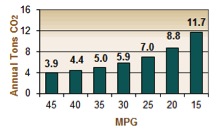Send your question to Umbra!
Q. Dear Umbra,
My wife and I are in the market for a new car. We’ve been looking at several options and are finally leaning toward a small vehicle that gets decent miles per gallon. Which makes me ask a few questions: Is it more important to get a hybrid for the mileage or should people be really concerned about emissions? Are hybrids and PZEVs [partial-zero emissions vehicles] equally good choices? And is it better to buy a car from a company that offers a majority of its models with a PZEV rating, or from a company that makes hybrids, but also manufactures some of the largest-consuming vehicles on the market?
Ryan H.
Constantia, N.Y.
A. Dearest Ryan,
How I love these simple questions. Obviously the answer is clear: Don’t buy a car!
OK, OK, every time I make such a utopian suggestion, readers across the country hasten to point out that where they live, cars are a necessity. If that’s the case for you — perhaps the Constantia subway system is not what it might be — I still hope you will try to drive your new car as little as possible. Walk, ride a bike, carpool, bundle your errands. Driving is responsible for 10 percent of climate emissions [PDF], or maybe 15 percent, and American drivers are responsible for nearly half of that. Besides the climate impact, driving pollutes our air, increases our isolation, and hurts our health. We should endeavor to drive less, no matter where we live.
End of rant, Ryan, and beginning of answers. Let’s start with a little refresher on automotive terms:
- A hybrid car runs on a combination of gas and electric power. Most hybrids typically get 45 to 55 miles per gallon, compared to an average of 29 mpg for conventional cars. (That average for conventional cars is set to rise to 35 mpg by 2016 and 54 mpg by 2025.) Typically hybrids cost roughly $5,000-$7,000 more than their gas counterparts, but much of that is recouped in fuel savings.
- A PZEV is a partial-zero emissions vehicle. These cars use regular gas, but their tailpipe emissions are 90 percent cleaner than a typical car thanks to whizbang technology related to their catalytic converters. They also have zero evaporative emissions, which are the vapors that can escape from a fuel system. Most of the major car companies make PZEV versions of regular models (e.g., the Ford Focus PZEV), which typically get about the same mileage and sell for just a bit more ($200 or so) than the regular version.
Originally available only in California and the Northeast, PZEVs are beginning to pop up all over the place. In fact, we have California to thank for a soup of “EV” options, including ULEV (ultra-low-emission), SULEV (super-ultra-low-emission), ZEV (zero-emission), and SWTULEV (super-wicked-totally-ultra-low-emission). I might or might not have made that last one up.
Still with me? Try this on for size: Many hybrids are PZEVs, but not all PZEVs are hybrids. Now that our heads are properly spinning, let us tackle your questions.

DOE
Is it more important to think about mileage or emissions? The answer is yes. All car shoppers should think about mileage and emissions, which are directly related — particularly when it comes to carbon dioxide, the main culprit in climate change. This handy chart from the Department of Energy says more than I ever could. See how the 45-mpg car emits far less CO2 than the others? While PZEV technology does a wonderful and important job reducing air pollution, it does not reduce carbon dioxide. As the gummint puts it [PDF], “CO2 emissions cannot be reduced by pollution control technologies.” This is why you should look for the best MPG you can find and can afford.
Are hybrids and PZEVs equally good choices? Since most hybrids burn so clean they qualify as PZEVs, let’s rephrase this question: Are hybrid PZEVs and non-hybrid PZEVs equally good choices? I think that new phrasing helps us see the answer. If you can afford the hybrid PZEV, it’s the better choice, because it goes the extra mile of reducing our reliance on fossil fuels and emitting less CO2. But a non-hybrid PZEV that gets decent mileage is still a good and responsible choice — particularly if you live in a big city, where air quality and public health are pressing concerns.
Is it better to buy from a company that makes a lot of PZEVs or a company that makes hybrids and giant gas-suckers? The companies that make non-hybrid PZEVs started doing so because state gummints in California and elsewhere forced them to. So although the technologies are super-ultra-cool, your PZEV purchase likely won’t change much. You can be sure that if state regulators woke up tomorrow and said, “Oh, just kidding about that whole PZEV thing,” most automakers would jump for joy and get back to business as usual. I believe you can have more of an impact, on the market and on our climate problem, by adding to the increasing demand for hybrids, even if — especially if — the company in question makes gas-suckers too. Send a message!
If a hybrid is simply out of your price range, finding a car with good mileage is key. If that good-mileage car is available in a low-emission version where you live, even better. And did I mention we should all drive less? Ride that bike on over to town hall and start lobbying the Constantia town fathers for a solar-powered subway system.
Utopianly,
Umbra





